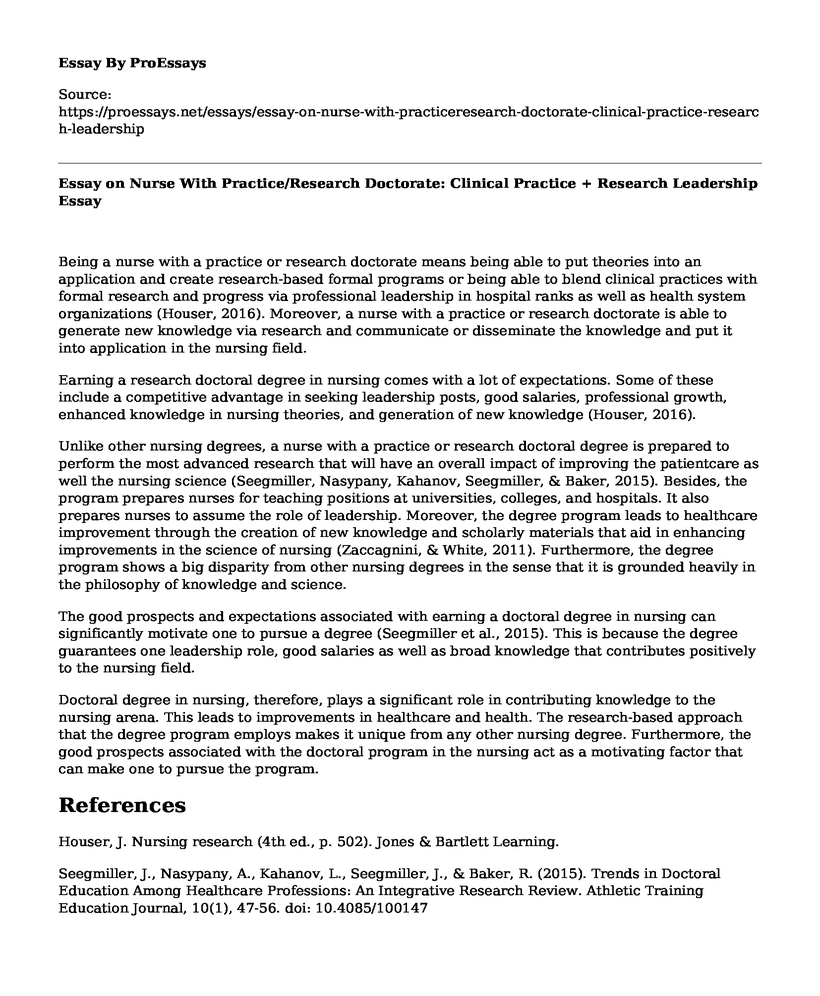Being a nurse with a practice or research doctorate means being able to put theories into an application and create research-based formal programs or being able to blend clinical practices with formal research and progress via professional leadership in hospital ranks as well as health system organizations (Houser, 2016). Moreover, a nurse with a practice or research doctorate is able to generate new knowledge via research and communicate or disseminate the knowledge and put it into application in the nursing field.
Earning a research doctoral degree in nursing comes with a lot of expectations. Some of these include a competitive advantage in seeking leadership posts, good salaries, professional growth, enhanced knowledge in nursing theories, and generation of new knowledge (Houser, 2016).
Unlike other nursing degrees, a nurse with a practice or research doctoral degree is prepared to perform the most advanced research that will have an overall impact of improving the patientcare as well the nursing science (Seegmiller, Nasypany, Kahanov, Seegmiller, & Baker, 2015). Besides, the program prepares nurses for teaching positions at universities, colleges, and hospitals. It also prepares nurses to assume the role of leadership. Moreover, the degree program leads to healthcare improvement through the creation of new knowledge and scholarly materials that aid in enhancing improvements in the science of nursing (Zaccagnini, & White, 2011). Furthermore, the degree program shows a big disparity from other nursing degrees in the sense that it is grounded heavily in the philosophy of knowledge and science.
The good prospects and expectations associated with earning a doctoral degree in nursing can significantly motivate one to pursue a degree (Seegmiller et al., 2015). This is because the degree guarantees one leadership role, good salaries as well as broad knowledge that contributes positively to the nursing field.
Doctoral degree in nursing, therefore, plays a significant role in contributing knowledge to the nursing arena. This leads to improvements in healthcare and health. The research-based approach that the degree program employs makes it unique from any other nursing degree. Furthermore, the good prospects associated with the doctoral program in the nursing act as a motivating factor that can make one to pursue the program.
References
Houser, J. Nursing research (4th ed., p. 502). Jones & Bartlett Learning.
Seegmiller, J., Nasypany, A., Kahanov, L., Seegmiller, J., & Baker, R. (2015). Trends in Doctoral Education Among Healthcare Professions: An Integrative Research Review. Athletic Training Education Journal, 10(1), 47-56. doi: 10.4085/100147
Zaccagnini, M., & White, K. (2011). The doctor of nursing practice essentials (1st ed., p. 552). Sudbury, Mass.: Jones and Bartlett Publishers.
Cite this page
Essay on Nurse With Practice/Research Doctorate: Clinical Practice + Research Leadership. (2023, Mar 02). Retrieved from https://proessays.net/essays/essay-on-nurse-with-practiceresearch-doctorate-clinical-practice-research-leadership
If you are the original author of this essay and no longer wish to have it published on the ProEssays website, please click below to request its removal:
- Structure of Program of Nursing Training School
- CPS Should Do a Lot to Support Student Living With Disabilities - Article Analysis Essay
- Article Analysis Essay on "The Syrian Humanitarian Disaster" and "A Crisis of Anxiety Among Aid Workers"
- Research Paper on Leadership Models: Navigating Diversity and Complexity in Organizations
- Essay Sample on Embracing Change in Leadership & Nursing: Maximizing Quality
- Understanding Cardiovascular and Thyroid Disorders: A Nursing Perspective - Paper Example
- Critical Appraisal: A Must in the Medical Field - Free Report Example







